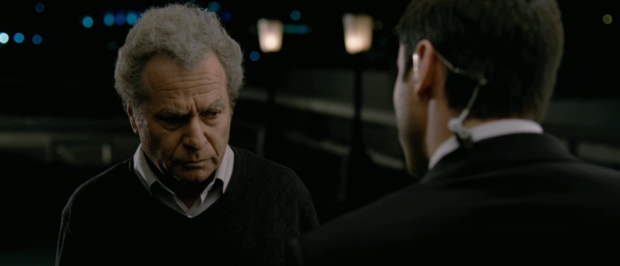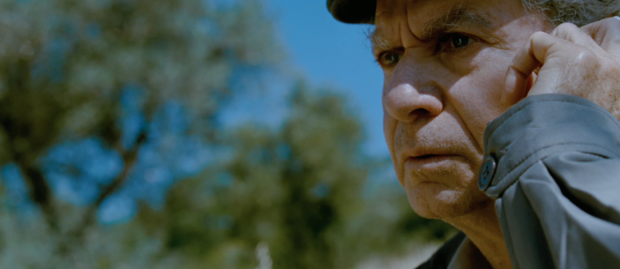Joseph Cedar‘s Footnote, winner of the Best Screenplay award at the 2011 Cannes Film Festival and one of four runners-up to Asghar Farhadi‘s A Separation for the most recent Best Foreign Language Film Oscar, is a curiously uneven depiction of a brewing father-son rivalry. It’s far from a smooth affair, in that the quite satirical comedic tone, while certainly contributing a unique humor, manages to liquify most of the potential for emotional epiphany. Patchy, too, is Cedar‘s tension within himself — as self-sufficiently word-driven as his screenplay is, he approaches the material with a very noticeable directorial personality, and it’s a decision that, creatively eager though it may be, produces mostly mixed results.
The familial pressure in Cedar‘s story stems from the opposite personalities with which the two main characters conduct themselves in the same profession — the study of Talmudic Research at the Hebrew University of Jerusalem. Eliezer Shkolnik (Shlomo Bar Aba), the reclusive father, operates with old-school proficiency and force of determination, while Uriel (Lior Ashkenazi), his rather more affable son, appears to function as much as a caved-in researcher as he does a public politician. Most everyone in the field respects Eliezer, but they like Uriel a whole lot more.
As the film begins, Uriel is awarded with a spot in the Israel Academy of Sciences and Humanities, and it becomes quite clear that, while Uriel’s career couldn’t be better, Eliezer’s time is beginning to slip away from him. His longheld dream of receiving the Israel Prize looks like a faint blip on the horizon, mostly because the head of the selection committee, Yehuda Grossman (Micah Lewensohn), nurses a perennial grudge against Eliezer.
If the Eliezer-Uriel dynamic is the film’s backbone, the relationship between the two leads and the other family members provides sturdy supporting material that packs some much-needed insight. Indeed, the father and son at the film’s center rarely do much of anything together, regardless of their occupational connection. But through the detached worry of Eliezer’s wife (Alisa Rosen), as well as the mounting distance between Uriel and his own wife (Alma Zak) and son (Daniel Markovich), we get a clearer, if not particularly subtle, understanding of what keeps these guys from functioning on the same wavelength.
Yuval Scharf, playing a budding newspaper reporter, also provides crucial perspective in a one-scene role. At a somewhat late juncture, her character is tapped to interview Eliezer, and the resulting conversation is one of striking unease. It’s one of the more revealing scenes in the film because, in spite of Cedar‘s incongruous attempts to stylize the dialogue, it’s Eliezer’s only real opportunity to speak face-to-face with an outsider. This makes it one of only a few renderings we get of Eliezer’s humanity.
Another filmmaker could’ve probably taken the basic conception of Footnote and made a more affecting film. The proportions between the characters are nicely drawn, and the film’s splendid final shot makes us readily aware, if we weren’t already, of the mass of built-up emotion Cedar has layered into the story. But in most respects, the writer-director opts for less-traveled routes. He embeds the storyline with a lightly comic tone that, while displaying an uncommonly adept hold on physical comedy (a repeated chairs-slamming-into-doors bit is a highlight), still strips the story of a good deal of its inherent weight.
Additionally, his overt attempts to conduct the screenplay cinematically give rise to the same up-and-down effect. When he chooses, for instance, to leave the camera entirely on Eliezer during Uriel’s aforementioned speech near the film’s outset, it is a surprising and inspired choice — it gets us thinking already about what’s under Eliezer’s skin when, in essence, the focus of the rest of the room is off-screen. Other attempts, however, like the montage-staged backstories, feel needlessly noisy.
That said, there are worse traits for a director to have than a full-fledged willingness to create visual storytelling. If Footnote is something that doesn’t necessarily call for such treatment, well, so be it. A better film could’ve been made here, but it would’ve been safer at the same time. Most days of the week, I’ll side with Cedar‘s rugged imagination.
Footnote will be released in New York and Los Angeles on March 9th and expand from there.



